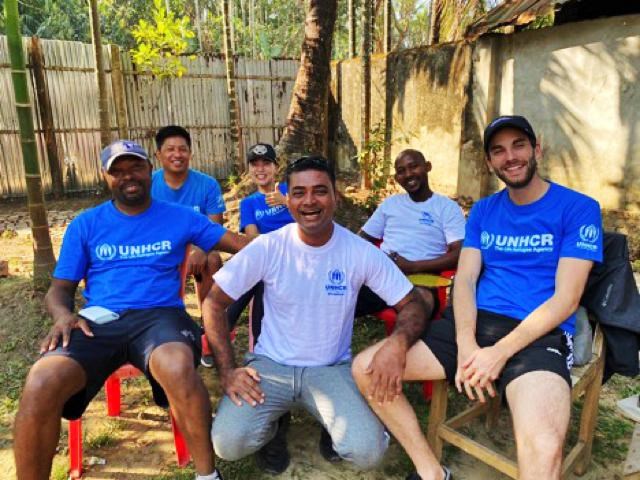A former Weyburn resident and graduate of the Weyburn Comprehensive School, Lane Krainyk, is making his mark on the other side of the world, working as a lawyer for the United Nations High Commissioner for Refugees in the country of Myanmar (formerly Burma).
Krainyk spoke to the Weyburn Rotary Club on Jan. 21 via Zoom, with a 12.5-hour time difference, and around 70 people listened in on his presentation about his work and experience since leaving Weyburn for post-secondary education about 15 years ago.
Explaining where he is and what his position entails, Krainyk said, “I am currently working with the Office of the United Nations High Commissioner for Refugees (UNHCR) in Myanmar. I previously worked as a Protection Officer in our office in Yangon, the largest city in Myanmar, but have been based in a field office in Rakhine state (near the Bangladesh border) for approximately one year.”
He explained some of the journey that led his position, noting he had been working for a large law firm in Toronto when the opportunity arose to work with the United Nations.
“Initially, I joined for a six-month fellowship supported by the University of Toronto Faculty of Law and the Government of Canada, but more than five years later I am still working for UNHCR, and have had the opportunity to work in different roles in Thailand, Bangladesh and Myanmar,” said Krainyk. “Here, we work to support stateless and conflict affected communities and Internally Displaced Persons (IDPs) to address their most urgent needs, and to promote sustainable solutions to displacement. A typical day involves lots of emails, meetings (mostly online these days due to COVID-19), and visiting communities with members of my team.”
He has had many great experiences in meeting people and learning about the local culture, both as part of his work and outside of it.
“Highlights of my time with UNHCR include meeting with the UN Secretary General and the Prime Minister of Bangladesh, working alongside amazing colleagues from all around the world and having the opportunity to work with resilient and inspiring communities that have overcome, or are working through, tremendous challenges,” he explained, noting that of eight colleagues in his office, they are all from different countries.
One of the biggest highlights of his time in Bangladesh and Myanmar was meeting former Ontario premier Bob Rae, who visited the region as Canada’s Special Envoy to Myanmar to look into the mass exodus of Rohingya refugees from Myanmar into neighbouring Bangladesh.
“Bob Rae was appointed as Canada’s Special Envoy to Myanmar following the influx of more than 800,000 Rohingya refugees from Myanmar into Bangladesh in 2016 and 2017. As you can imagine, the scale and complexity of the challenges posed by this rapid and large-scale displacement were enormous, and the response required significant efforts from all actors, including the host country, Bangladesh, UN agencies, NGOs, and other countries.
“At the time of this crisis I was in Bangladesh, and I saw first-hand how Canada responded, including by extending significant support to Bangladesh and agencies operating in both Myanmar and Bangladesh to assist Rohingya and other affected communities, helping to lead the efforts of the donor community, and appointing Mr. Rae as a high level envoy to engage various actors,” he said, relating when he met him after a long flight.
“I recall being in a meeting with Mr. Rae (who is now Canada's Ambassador to the United Nations) in Dhaka after he arrived in the early morning hours on a redeye flight from North America. I was impressed with his understanding of the complex and multifaceted situation on the ground, and with his energy after a long flight and limited sleep,” said Krainyk, adding with a chuckle that Rae had more energy than he did. “That was impressive on a personal level to see.”
For part of his presentation, he spoke about how COVID-19 has impacted his work in that part of the world. “Living and working on a small compound during COVID-19 has certainly proved very interesting. Peanut butter, cheese and microwave popcorn have become my most frequent cravings (and, fortunately, at least peanut butter is now available locally after a hiatus of some months). To get some activity, I typically run up and down the stairs between my accommodation and my office. My socialization is mostly limited to the compound cats, the occasional snake (less welcome), and of course lots of friendly colleagues.”
In an interview with the Review, he touched on what life in Myanmar is like, such as the weather and the local food.
“Certainly I prefer February weather in Myanmar (currently 23 degrees) to February weather in Weyburn (currently -20). But it is all relative, and these days at a cool 17 degrees I am reaching for my jacket. In my defence it is consistently well over 30 and very humid much of the year.
“The food in Myanmar is fantastic. Myanmar is an incredibly diverse country, and the food reflects that reality, boasting excellent and very spicy seafood, delicious and unique noodle and rice dishes, and some national treasures like Mohingya (a breakfast soup) and Lah Pet Thoke, which is a tea leaf salad, which I can assure you is much tastier than it sounds.”
He added that he’s enjoyed his time in Myanmar and has found it to be a personally rewarding experience.
“Myanmar is a very multicultural country, home to people who speak different languages, practice different faiths and come from different backgrounds. One of the most rewarding aspects of my time in Myanmar has been having the opportunity to meet people who, while from one country, come from all walks of life,” he said.




